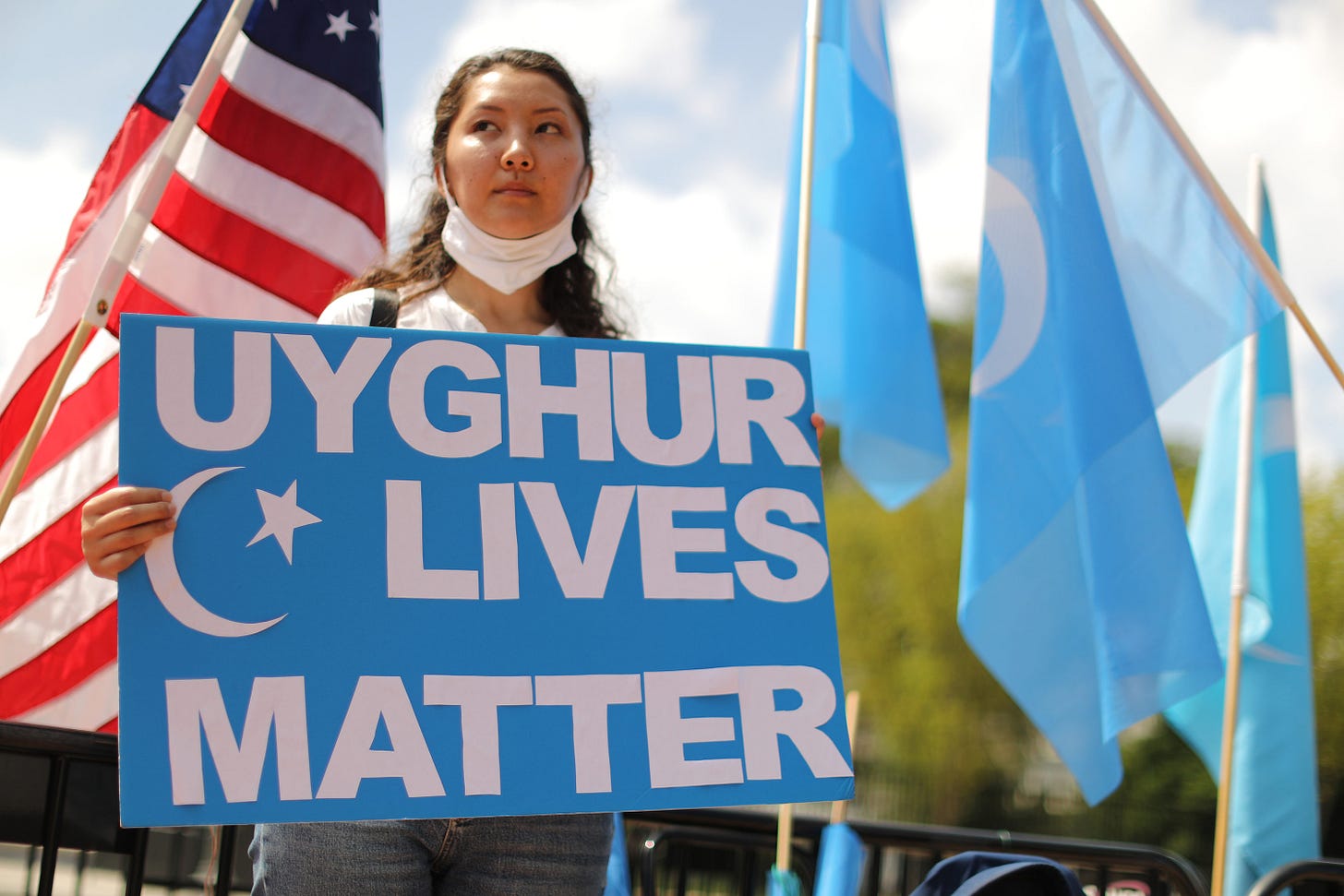Who Will Speak for the Uighurs?
Speaking up for the world’s most vulnerable might help to remind us of who we once were and can be again.

It’s easy to imagine how the conversation between Xi Xinping and Donald Trump went—the one John Bolton recounted in his book. Xi doubtless told Trump that China was putting a few of the nation’s 12 million Uighurs, the ones who had displayed terrorist tendencies, into special schools where they were interned and reformed before being released. Mr. Muslim Ban cheerfully assented, telling the Chinese dictator that he was doing “exactly the right thing.”
Of course, as everyone with greater than 8th-grade reading comprehension knows, Xi’s depiction was pure agitprop. China is not targeting Uighurs who have shown terrorist tendencies, it is crushing an entire ethno/religious minority in brutal fashion. Even if he only selectively scans newspapers looking for mentions of his own name, Trump must have been told this at some point during a briefing. Then again, he has a tendency to believe strong men more than American officials.
This drone footage showing hundreds of blindfolded and shackled Uighur men being boarded onto trains is reminiscent of World War II. The so-called re-education camps are, in reality, concentration camps, holding up to a million men, women, and children. Last week, Chinese officials brazenly insisted that these camps are “vocational education schools,” no different from those in Western nations. Except for all that barbed wire, those guard towers, and massive concrete walls. The Uighurs’ supposed “terrorist” activities? Praying at the mosque too often. Refusing to watch state television. Growing a beard. Simply being a minority (ethnic Kazakhs are also targeted). While imprisoned, the Economist reports, inmates are forced to “criticize Islam, eat pork, speak Mandarin instead of their own Turkic tongue, and praise Xi Xinping.” Escapees tell of mistreatment, beatings, and torture.
While “schooled” in these benevolent vocational institutions, Uighurs are also being used as forced labor. Sen. Marco Rubio has introduced legislation to create a “rebuttable presumption” that goods from Xinjiang province are products of forced labor and therefore ineligible for import to the United States.
Now comes news that in addition to all of the above, China is engaged in a policy of forced abortion and sterilization against Uighur women. A Uighur doctor who escaped to Turkey told iTV that she had performed up to 600 forced abortions and removal of wombs. In one case, she said, the baby was still moving when it was dropped in the trash. The policy is working. The Han Chinese population of Xinjiang province is growing, while the Uighur birthrate has plummeted by 60 percent.
Just as President Trump was reluctant to criticize China’s handling of COVID-19 in the early months of 2020 because he was hoping for a trade deal, he has said that he was reluctant to impose sanctions over the ethnic cleansing of Uighurs for the same reason. Under pressure, he finally did sign the Uighur Human Rights Policy Act in June, a slap on the wrist that imposed sanctions on a couple of Chinese officials.
But imagine for a moment that we had a president who was not spewing spittle about a Fox News reporter for confirming a damning Atlantic magazine piece, cheering on his followers’ vigilante violence, or tweeting about Nancy Pelosi’s hair appointment. Imagine that we had a president with the dignity and largeness of vision to understand that America still means something in the world. When we uphold human rights and human dignity, we are the America the world trusts.
A foreign policy that asserts “America First” is obnoxious to our allies and redolent of a discredited past, but above all it is a moral abdication. If the United States no longer speaks for the oppressed, for the silenced, for the persecuted, it loses its soul.
Trump partisans will protest that we cannot engage in “endless wars” for other nations. But that’s a dodge. No one is suggesting war.
No, the U.S. should demand a United Nations investigation. We may disdain the international organization, and our skepticism is well-founded in many ways, but other nations do pay attention to what happens there. The Trump administration has pulled away, leaving more scope for China to exert influence. Our diplomats should raise the Uighurs, Kazakhs, and Tibetans too at every international forum. In concert with our allies, we should demand transparency from the Chinese. They won’t comply, but we can make it as embarrassing as possible for them.
In 2004, former “refusenik” Natan Sharansky recalled what it was like, as a prisoner in the Soviet gulag, to hear that President Ronald Reagan had declared the USSR to be an “evil empire.”
It was the brightest, most glorious day. Finally a spade had been called a spade. Finally, Orwell's Newspeak was dead. President Reagan had from that moment made it impossible for anyone in the West to continue closing their eyes to the real nature of the Soviet Union. . . . It was one of the most important, freedom-affirming declarations, and we all instantly knew it.
We feel that we’re drowning in our own troubles in 2020 America. But speaking up for the world’s most vulnerable might help to remind us of who we once were and can be again.


